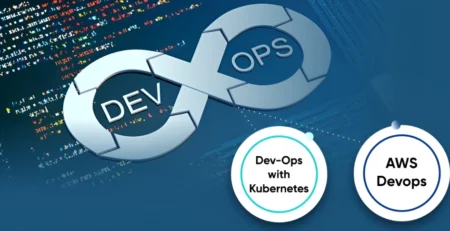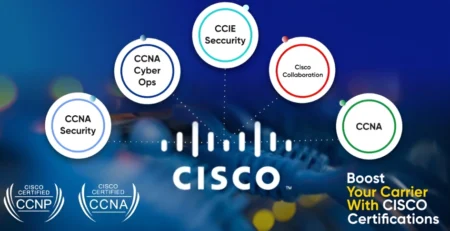Potential Career Opportunities After Earning Your CCNA Course Certification
If you have recently passed the Cisco CCNA course certification, you are all set to take on more responsibility in the IT and networking industries. Furthermore, as you start your job search on vast platforms like LinkedIn, Naukari, Indeed, and FoundIt, among others, it is imperative to know the multiple job titles associated with the CCNA exam.
Nevertheless, searching for the right job profile might be one of the daunting tasks you have to deal with. Likewise, it mainly happens because the Cisco CCNA course used to offer multiple CCNA certifications, each concentrating on various skill sets, such as security, routing, cyberops, and networking. Therefore, every passing year, Cisco drastically changes its exam structure to include five imperative tiers of certifications, such as Architect, Entry, Professional, Expert, and Expert. However, in this comprehensive blog, we will discuss the career opportunities this certification holds.
Role of CCNA in Certifying IT Professionals and Companies
Within today’s fast-evolving digital world, organizations require network professionals who not only resolve current problems but also foresee coming issues by taking advantage of new technologies. The CCNA course certification is instrumental in helping professionals meet such dynamic demands. Furthermore, it offers a solid theoretical background supplemented with hands-on know-how that equips network administrators and engineers to drive the performance, security, and dependability of their organization’s IT infrastructure to its optimal level.
Cisco divides its certification hierarchy into several levels, starting with entry-level, then associate, professional, expert, and finally reaching the architect level. Furthermore, CCNA is placed at the associate level, which means that it represents an essential stepping stone for someone who hopes to develop their career further in the field of network engineering and other fields. Nevertheless, Cisco CCNA training certification is a standard for core networking knowledge, indicating to employers that the holder has hands-on skills in designing, implementing, and managing Cisco-based network solutions.
Career Opportunities After Completing CCNA Certification
The necessary certifications are typically listed in the “preferred certifications” section of seemingly generic IT job postings. Because the CCNA training online certification covers a broad scope of subjects, most jobs that require a CCNA will have more general titles. Some examples of jobs that will probably require a CCNA are:
1. Network Administrator
Network administrators are charged with maintaining the computer network. It is occasionally an entry-level position, but frequently a bachelor’s degree, CCNA, or equivalent experience is needed. Hence, tasks can include installing hardware, resolving connectivity problems, fixing devices, installing malware applications, and addressing lower-level security concerns.
Pay scales differ depending on the organization’s specific responsibilities, location, and size. Expect to earn a salary ranging from $60,000 to $90,000.
2. Network Engineer
A level higher than network administrators are network engineers. However, this job typically involves designing, developing, and maintaining the computer network of an organization. They can work with hardware and software, address lower-level security issues, and assist in fixing or upgrading devices.
Additionally, the salary and specific duties will, naturally, depend on location and the company. Some network engineer positions may require certifications in addition to a Cisco CCNA course. However, experience can be sufficient. Therefore, the salary for a network engineer is around $100,000 to $150,000. Learning another skill can increase your pay.
3. Systems Administrator
It is also referred to as sysadmins, systems administrators ensure that an organization’s computer system operates efficiently and effectively satisfies the needs of all individuals within the organization. Furthermore, duties may involve solving problems, maintaining computer servers, and making sure the networks operate quickly and efficiently.
Furthermore, the sysadmin will earn between $80,000 and $130,000, depending on the location, organization, and job responsibilities. Likewise, apart from the CCNA training online certification, take systems administrator training to be qualified for these types of positions.
4. System Engineer
A system engineer is tasked with installing a computer system. Typical duties involve planning, designing, and installing a computer network or computer system. Although system administrator and system engineer are at times utilized interchangeably, engineers typically design a system, while administrators maintain the system once installed.
Further, the salary for a system engineer ranges from $90,000 to $140,000, depending on location, job duties, and other benefits and bonuses.
Key Features of Rexton IT Solutions’ CCNA Course
| Feature | What It Offers / Why It Matters |
| Flexible Learning Modes | You can opt for online or offline (classroom) training. This helps whether you prefer in-person interaction or need to learn remotely. |
| Instructor-Led Training | Classes are led by certified trainers who have real industry experience. You get live teaching, not just pre-recorded videos. |
| Hands-On Labs & Simulations | Practical exposure with real or virtual lab setups. Important for CCNA because networking concepts need configuration & troubleshooting practice. |
| Updated Study Materials & Mock Tests | Study resources aligned with the latest Cisco CCNA (200-301) exam blueprint. Mock tests help you practise under exam-like conditions. |
| Interview / Job Preparation & Placement Support | They provide help with resume building and interview preparation. Also, a “Job Guarantee Program” or strong placement support is highlighted. |
| Lifetime Revision / Revision Classes | Once enrolled, students can come back for revision sessions. Helps to keep knowledge fresh. |
| Good Lab Setup / Real-Environment Feel | Emphasis on live environments, good lab resources & realistic setups. Helps in applying theory to practice. |
| Small / 1-to-1 Training Options | Allows personalized attention; if needed, you can get one-on-one training. Useful for learners who require a more gradual pace or additional support. |
| Industry-Oriented Curriculum | The syllabus includes not only basic networking but also security, automation, wireless, etc., so you’re ready for fundamental job roles. |
| Certified Faculty | Trainers have Cisco certifications themselves; they bring experience from working with real networks. |
| Global & Competitive Job Prospects | They promote that completing CCNA opens opportunities in MNCs, abroad, and offers a better salary, etc. Helps motivate and gives direction. |
It’s Time to Wrap Things Up!
We are all familiar with the fact that job profiles and responsibilities are not set in stone and often vary based on the size of different companies, whether they are government organizations, business entities, or the IT and technology strategies they employ. Furthermore, if you are searching for an institute to enroll in Cisco CCNA training, look no further than Rexton IT Solutions. We offer a comprehensive range of courses that fit easily into your budget and help you upgrade your skills to build a successful career in various industries.











